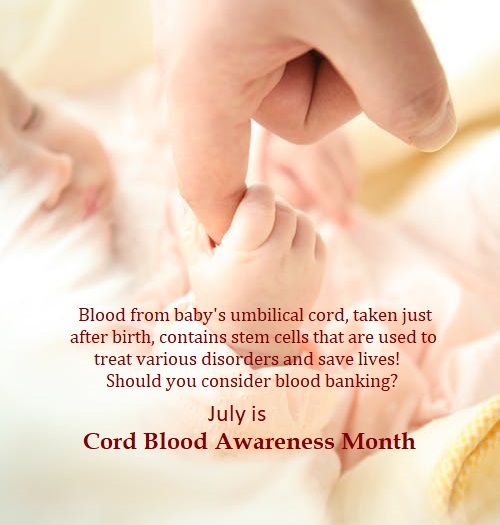Umbilical cord blood (UCB) is rich in stem cells, which have the potential to be used to improve and save lives once they are collected and preserved for future medical use.
Over the past 30 years, since the first cord blood transplant was performed in Paris, France, the industry has continued to evolve in clinical applications. UCB is primarily banked and then available for treatment potential and compatibility. UBC can be legitimately used for treatment of over 80 diseases including:
- Certain blood disorders (leukemia, lymphoma, anemia)
- Immune disorders
- Genetic disorders
- Inherited metabolic disorders
- Possible transplant matches
Cord Blood Collection
Obstetricians have a key role in UCB as they spread awareness, counsel expectant parents about their options and also serve as the UCB collectors. It is wise not to wait until delivery to make the decision to bank cord blood as arrangements must be made with the hospital and cord blood bank in advance. UCB collection is performed immediately after birth and is safe, painless and voluntary. The delivering physician clamps and cuts the cord, collects the blood in the umbilical cord and the cord itself in a sterile, protective cup. Then, a pre-arranged courier picks it up for processing in the lab. Once it is prepared and the stem cells have been extracted, it is cryopreserved and stored or “banked” for future medical use. Recently, experts estimated there are almost 6 million cord blood units “banked.”
Public or Private Banking?
In the U.S., health insurance does not cover cord blood collection, processing or banking fees. Patients collecting UCB can choose to donate cord blood and have it stored in a public cord blood bank and the costs are free. Donated cord blood could help save the life of someone in need or be used for valuable medical research. Patients can also choose and pay for private UCB banking. Privately banked cord blood is stored just for the family’s future use. It may help treat a family member who is sick and needs a stem cell transplant.
Upfront costs can vary from $500 to $2,500, plus an annual storage fee of around $300-500. Recently, private UCB has sharply increased and public UCB is going down.
There is no current, scientific data how long stem cells may be “banked,” although experts have stated that preserved stem cells have no expiration date and frozen stem cells may remain so indefinitely without losing their properties once thawed.
Cord Blood Banking and the Future
Although many view UCB as “biological insurance,” advanced cell therapies, especially in the areas of regenerative applications such as cerebral palsy and autism, are being studied intently. In tracking “released” UCB, 50% of clinical uses have been for brain injury patients and about 26% for congenital anomalies.
Today, approximately 1:1,000 is the ratio of “used” UCB to “banked” UBC. Although there is much promise and great potential with the current and future uses of UCB, there is no guarantee on the return of banked UCB. We do know that research drives medical progress and numerous patients have achieved the benefits of banked cord blood.
For more information and to spread the news about UCB Banking during National Cord Blood Awareness Month, visit: www.parentsguidecordblood.org
~Tanya Mack, President


